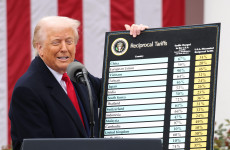Top Stories
Supreme Court to Rule on Trump’s Tariffs: Major Impact Ahead

URGENT UPDATE: The Supreme Court is set to hear a pivotal case regarding President Donald Trump’s controversial tariffs, with oral arguments scheduled for November and a decision expected by year-end. This ruling could redefine the balance of power between the presidency and Congress, with significant implications for the U.S. economy.
Just announced, Trump’s legal team has filed a petition challenging the legality of his tariffs, which experts widely deem unconstitutional. If the Supreme Court upholds the lower court’s findings, it could grant importers the right to seek refunds for hundreds of billions in tariffs. This potential outcome raises urgent questions about the economic consequences for American businesses and the federal budget.
Authorities report that importers have already paid as much as $100 billion in tariffs, which could trigger a wave of refund claims if the Supreme Court rules against Trump. The U.S. Treasury could face a budget shortfall of over $4 trillion due to the loss of tariff revenue—complicating efforts to finance Trump’s tax cuts.
The stakes are high. Trump and his allies argue that upholding the tariffs is crucial for national security and economic stability. Marco Rubio, Secretary of State, warns that a Supreme Court ruling against the tariffs could create a “foreign policy disaster,” jeopardizing U.S. interests globally.
In a striking twist, investment firms, including Cantor Fitzgerald, are exploring ways to capitalize on potential tariff refunds, raising ethical concerns about profiting from a government policy many deem unlawful. Elizabeth Warren and Ron Wyden have vowed to investigate these practices, highlighting the increasing scrutiny surrounding Trump’s tariffs.
As this legal battle unfolds, the broader implications for U.S. trade relations are significant. The tariffs have affected key sectors, including pharmaceuticals, with Trump previously threatening up to 250% tariffs on Irish exports. Analysts suggest that while some businesses are stalling investments, major corporations are unlikely to relocate operations back to the U.S.
The bond market is already reacting to the uncertainty. Following the Court of Appeals ruling, Treasury yields surged, reflecting concerns over the potential fallout from a Supreme Court decision that could disrupt the financial landscape.
Experts across the political spectrum agree: the legality of Trump’s tariffs is under serious question. Ilya Somin, a constitutional law expert, describes the tariffs as a “blatantly illegal usurpation of legislative power,” emphasizing the urgent need for the Supreme Court to uphold constitutional checks and balances.
As the situation develops, all eyes will be on the Supreme Court’s decision, which could reshape the future of U.S. trade policy and the economy. The potential for widespread refund claims could unleash a torrent of legal actions, significantly impacting small and medium-sized businesses that have borne the brunt of the tariffs.
What’s next? The Supreme Court’s ruling will be closely watched, not just for its legal ramifications but for its potential to alter the trajectory of the U.S. economy. As the nation awaits this critical decision, the implications for importers, consumers, and the broader economic landscape remain uncertain but undeniably significant.
Stay tuned for updates as this urgent story unfolds.
-

 Top Stories2 months ago
Top Stories2 months agoTributes Surge for 9-Year-Old Leon Briody After Cancer Battle
-

 Entertainment3 months ago
Entertainment3 months agoAimee Osbourne Joins Family for Emotional Tribute to Ozzy
-

 Politics3 months ago
Politics3 months agoDanny Healy-Rae Considers Complaint After Altercation with Garda
-

 Top Stories3 months ago
Top Stories3 months agoIreland Enjoys Summer Heat as Hurricane Erin Approaches Atlantic
-

 World4 months ago
World4 months agoHawaii Commemorates 80 Years Since Hiroshima Bombing with Ceremony
-

 Top Stories2 months ago
Top Stories2 months agoNewcastle West Woman Patricia Foley Found Safe After Urgent Search
-

 Top Stories4 months ago
Top Stories4 months agoFianna Fáil TDs Urgently Consider Maire Geoghegan-Quinn for Presidency
-

 World4 months ago
World4 months agoGaza Aid Distribution Tragedy: 20 Killed Amid Ongoing Violence
-

 World4 months ago
World4 months agoCouple Convicted of Murdering Two-Year-Old Grandson in Wales
-

 Top Stories3 months ago
Top Stories3 months agoClimbing Errigal: A Must-Do Summer Adventure in Donegal
-

 Top Stories3 months ago
Top Stories3 months agoHike Donegal’s Errigal Mountain NOW for Unforgettable Summer Views
-

 World4 months ago
World4 months agoAristocrat Constance Marten and Partner Convicted of Infant Murder









